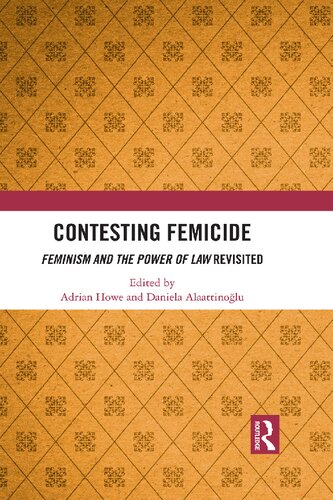

Most ebook files are in PDF format, so you can easily read them using various software such as Foxit Reader or directly on the Google Chrome browser.
Some ebook files are released by publishers in other formats such as .awz, .mobi, .epub, .fb2, etc. You may need to install specific software to read these formats on mobile/PC, such as Calibre.
Please read the tutorial at this link: https://ebookbell.com/faq
We offer FREE conversion to the popular formats you request; however, this may take some time. Therefore, right after payment, please email us, and we will try to provide the service as quickly as possible.
For some exceptional file formats or broken links (if any), please refrain from opening any disputes. Instead, email us first, and we will try to assist within a maximum of 6 hours.
EbookBell Team

4.0
6 reviewsFocusing on femicide, this book provides a contemporary re-evaluation of Carol Smart’s innovative approach to the law question as first outlined in her ground-breaking book, Feminism and the Power of Law (Routledge 1989). Smart advocated turning to the legal domain not so much for demanding law reforms as construing it as a site on which to contest gender and more particularly, gendered constructions of women’s experiences. Over the last 30 to 40 years, feminist law scholars and activists have launched scathing trans-jurisdictional critiques of the operation of provocation defences in hundreds of femicide cases. The evidence unearthed by feminist scholars that these defences operate in profoundly sexed ways is unequivocal. Accordingly, femicide cases have become critically important sites for feminist engagement and intervention across numerous jurisdictions. Exploring an area of criminal law that was not one of Smart’s own focal concerns, this book both honours and extends Smart’s work by approaching femicide as a site of engagement and counter-discourse that calls into question hegemonic representations of gendered relationships. Femicide cases thus provide a way to continue the endlessly valuable discursive work Smart advocated and practised in other fields of law: both in articulating alternative accounts of gendered relationships and in challenging law’s power to disqualify women’s experiences of violence while privileging men’s feelings and rights.